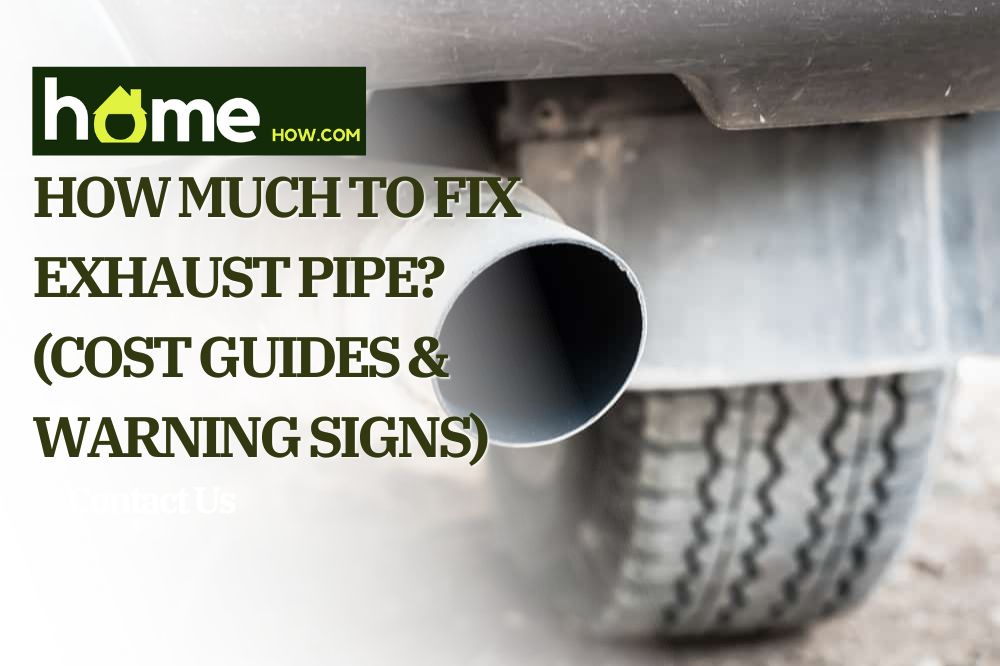Does your engine produce louder noise or your fuel mileage has worryingly taken a tailspin? Then you might have an exhaust leak. While exhaust leaks might not seems serious at first, fixing the problem ASAP is essential! Exhaust leaks aren’t prevalent issues, but they happen. Luckily, they are easy to fix when identified earlier. But how much does it cost to fix an exhaust pipe?
The average cost of repairing an exhaust pipe will vary and can range from $160 to $330. If it’s minor damage, you can fix it yourself. For example, you can apply epoxy around the leak. But if the damage is caused by a crack, hole, or rust in the vehicle’s exhaust system, you need to seek professional help from a muffler repair shop.
In this guide, you’ll learn how much it will cost to fix an exhaust pipe, the benefits of fixing the issues, and various signs of exhaust damage.
Why You Should Fix an Exhaust Pipe
Here are two reasons you should fix an exhaust pipe as soon as possible:
1. Unsafe to drive a car with the damaged exhaust pipe
Driving a car with a damaged exhaust pipe is risky, yet you can easily get aftermarket parts. For one, the unit’s fumes are toxic, as they contain lethal carbon monoxide if you inhale them. The damage will decrease your vehicle’s efficiency, making it difficult to offer similar mileage.
2. Faster Exhaust Leak Repair Time
Fixing an exhaust pipe will take 2 to 3 hours on average. It will take less time if it’s easy to repair. But if the source of the damage is difficult to locate or hard to fix, it will take more hours. In that case, the cost of fixing the leaking exhaust pipe will be higher.
How Much Does it Cost to Fix an Exhaust Pipe?
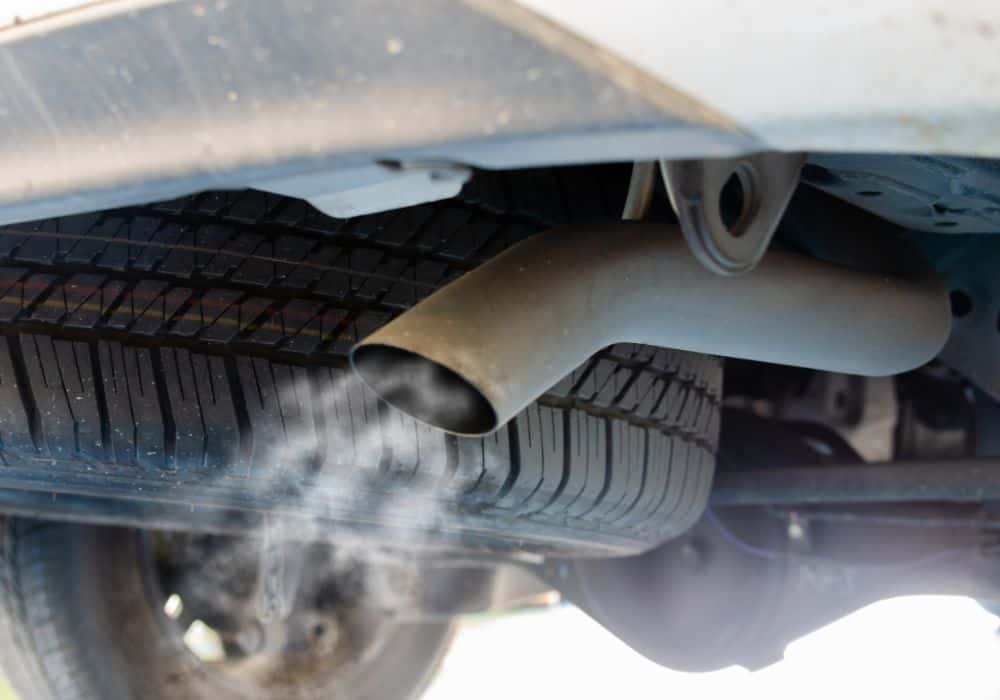
According to various estimates, you’ll need $160 to $330 to fix the exhaust pipe.
But if you find out the damage is caused by a hole or a break in the exhaust unit, you should allow a muffler repair expert to handle the work. Such a professional will weld the damaged or replace the exhaust pipe to ensure the combustion chamber is leak-proof. However, make sure you get a quote beforehand.
1. How Much to Replace an Exhaust Pipe?
You may need to replace the exhaust pipe to fix the damage fully. In this case, prepare to part ways with $835 to $860. This includes costs of parts and labor expenses.
The replacement costs may be lower or higher based on your car model. For instance, replacing a Nissan or Toyota Camry exhaust pipe is cheaper than that of high-end cars like Mercedes Benz. However, you can buy the exhaust and follow these instructions to replace it yourself.
2. How Much Does It Cost To Replace the Donut Gasket?
Replacing the gasket/flanges can cost $100 to $400 on average. This will depend on the model and make of the donut machine.
3. How Much to Fix a Manifold?
The price of fixing a manifold leak will vary based on the problem’s severity, the leak’s type, and the mechanic’s skills. But on average, the cost can be $340 to 420.
4. How Much to Replace Exhaust Pipe Bolts?
Exhaust pipe bolts and nuts are vital components of the exhaust system as they keep the pipe firmly attached to the exhaust unit. These bolts can become loose and might need replacement. The cost will depend on the size and type of bolts. But the price is $10 per bolt.
What You Need to Know About an Exhaust Pipe
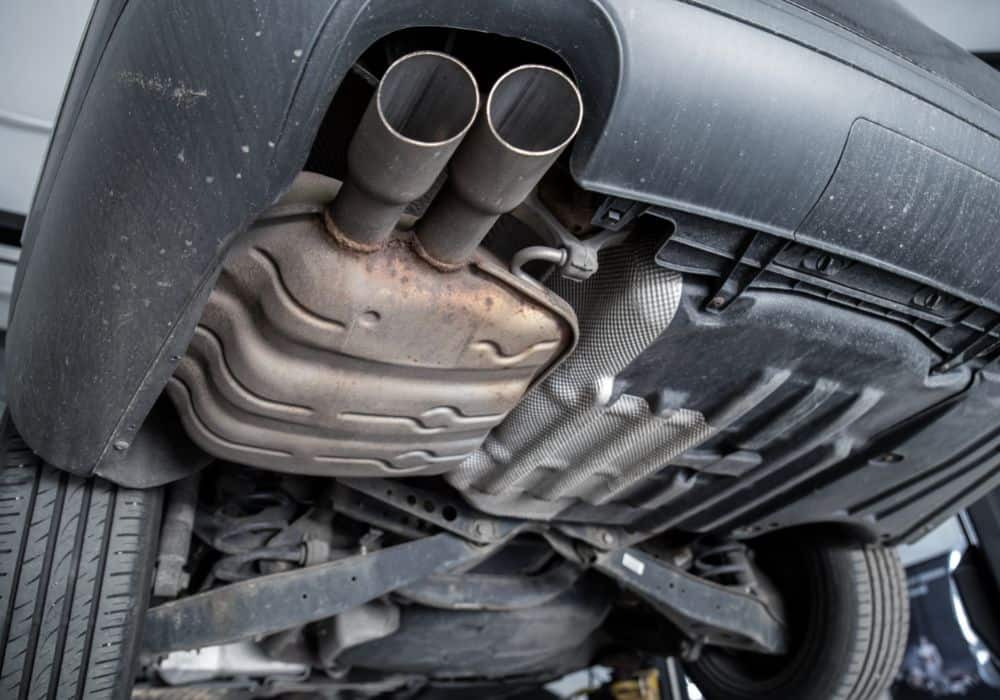
If there’s a leak in your vehicle’s intake manifold and you fail to fix it, the engine will have severe damage. Even though fixing the exhaust pipe appears straightforward, it will require some equipment. You need to solve the issue now to avoid costly repairs in the future.
Location
An exhaust pipe is situated at the back of a car, and its work is to remove exhaust gasses and exhaust fumes from the engine. This unit removes the toxic fumes, transfers the emissions, and releases them from the tailpipe.
Auto Parts of an Exhaust Pipe
An exhaust pipe is one of the main components of an exhaust unit. Other parts include:
- Aluminum muffler
- Catalytic converters
- Exhaust manifold gasket
- Resonator
- Tailpipe
- Filters
- Clamp
- Rubber
- Accordion
Determining the Source of the Issue
In most cases, road salts cause corrosion to the exhaust pipe and the entire undercarriage of a car. To completely solve this issue, you need to assess all these components to determine where the issue is. This is the best way to choose an effective way to repair an exhaust flex pipe.
Identifying the location of an exhaust leak isn’t easy. The leaks can come from any spot within the exhaust unit. Therefore, any part of this unit is a potential source of the leak or issue. The leak could originate from the exhaust pipe. If there’s a sign that your exhaust pipe leaks, start by inspecting these components since they are the possible suspects.
When to Repair an Exhaust Pipe
Make sure you repair a leak immediately after you notice an issue. You can’t expect your mechanic to notice this issue since you’re the one with your car, not him. Therefore, once you notice any signs of a leak, take your car to a reliable mechanic.
Also, if you hear the engine making strange noises, see a mechanic inspect it. Do this before the engine develops serious issues that are costly to fix.
Warning Signs of a Leaking Exhaust Pipe
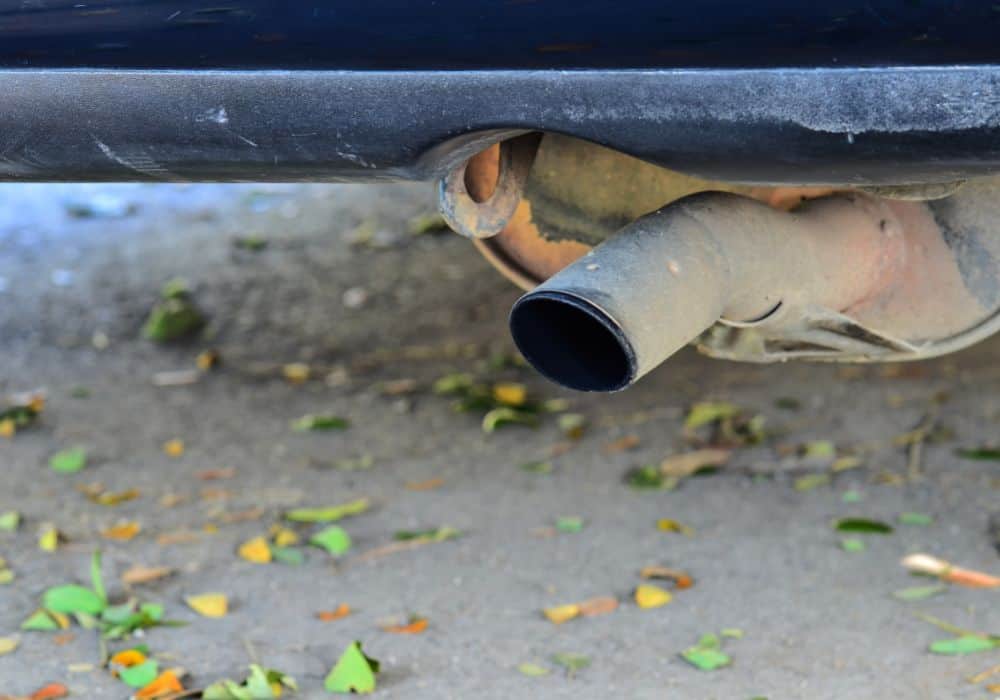
You should notice changes in your vehicle’s operation if there’s an issue with one of its units or the components’ exhaust unit. You can start by checking the cabin for any physical damage. Some symptoms of an exhaust leak, such as the check engine light will help you know when your exhaust pipe has issues. Others include:
1. The Engine isn’t Running as Normal
Whenever you feel changes in the engine’s operation, know that there’s a problem with one of its components. A cursory inspection of the engine’s major components will help you identify the problem. If there is no problem, check your exhaust chambers and tools like jack stands and wrenches to make it easier.
2. Engine Becomes Noisier
If the engine produces strange noises, you might have an issue with the exhaust unit. This is the common sign of an exhaust leak. As a car owner, you’re the only individual who can tell when your engine isn’t running well. That’s a warning that you need to pay attention to even minor issues.
3. Vibrations at the Gas Pedal
Does the gas pedal vibrate while driving? Then this is assigned to an exhaust leak. When there’s a leak in the exhaust system, there will be a rumbling sensation that you’ll feel underneath your feet as you drive.
4. Fuel Efficiency Starts to go Down
Once you notice that your vehicle’s gas consumption has abruptly dropped, the exhaust pipe might be leaking. This is another common symptom of an exhaust leak issue. The gas sensor will be triggered whenever there’s a leak in the exhaust system. That means the engine is getting insufficient fuel due to the leak, making the car engine work hard, and the car won’t optimize its use of gas.
Therefore, if you realize that your vehicle consumes a lot of gas while using the same routes you take daily, it’s a sign of a leak. Fix the issue to avoid further damage to the car engine.
How to Determine the Sound of an Exhaust Leak
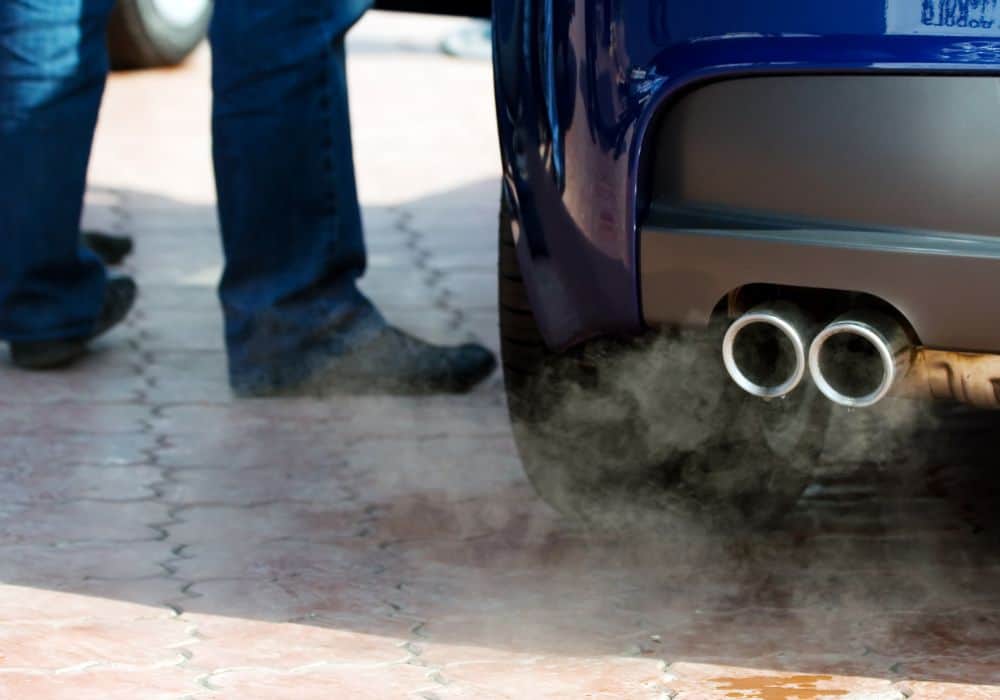
Knowing how to determine the sound of an exhaust leak is important. This helps you notice the issue before it worsens. Here is how to find out the sound of an exhaust leak.
- Start the ignition, open the car hood, and stand next to the engine bay
- Try listening to a distinct sound coming from the manifold
- The exhaust leak will sound like a ticking or puffing sound
- Attempt listening to any leak at the union or joints of the exhaust unit
- Once you reach the catalytic converter and find your way back, the leak might sound like a buzz or hum. It might sound like your vehicle is a hot rod.
- If the noise is too loud, the hangers are faulty, and the leak is closer to the engine.
Don’t try to patch the hole when the exhaust unit is hot. When doing this task, have a person revving up the engine alternatingly. This allows you to hear the variations in the exhaust unit’s sound.
Final word
To conclude, the average cost of repairing a damaged flex exhaust pipe ranges from $160 to $330. However, you can fix it yourself if the damage is minor. For instance, you can seal holes in the mufflers using a sealant. But if you find out the leak is because of a hole or a break in the exhaust system, let a professional from a muffler repair store fix the issue. Some of these repairs include:
- Replacing the exhaust pipe
- Adding a new muffler
- Replacing the catalytic converter
The degree of the exhaust pipe issue will determine the time it takes to fix it. However, the entire process will take 2 to 3 hours on average. The duration it will take will also rely on:
- How easy or hard it is to access the manifold
- The actual source of the leak
- The condition of the leak
If you think your exhaust pipe might be having issues, a visual inspection by an experienced mechanic will help define the cause and advise the viable course of action.
Don’t forget to comment if you have questions or concerns about your exhaust system.
